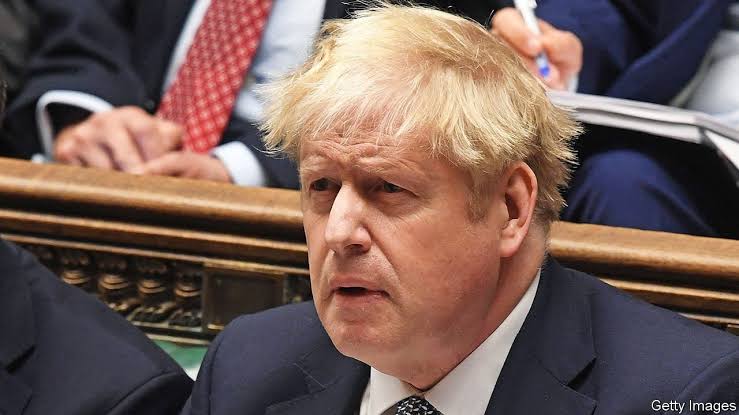British Prime Minister Boris Johnson could finally get sight of the highly-anticipated “partygate” inquiry as early as this weekend after police insisted they had not delayed its publication.
Reports circulated of potential outside challenger for the Tory leadership as the wait continued for the official investigation by senior civil servant Sue Gray into possible lockdown breaches in Downing Street and Whitehall.
It is widely believed that Chancellor Rishi Sunak or Foreign Secretary Liz Truss are frontrunners to win the top job if the PM is ousted.
But the Daily Mail reported on Friday that centrist Tories are backing ex-soldier Tom Tugendhat to be Johnson’s successor.
The newspaper said some Conservative MPs believe the Foreign Affairs Select Committee chairman represents the “best chance for a fresh start”.
Meanwhile, fresh allegations emerged regarding a reported get together on Johnson’s birthday in June 2020.
The Telegraph reported on Friday evening that the PM’s wife, Carrie, had sent messages to No ten staff offering to bring a cake to the gathering.
The publication of the long-awaited Gray report into alleged lockdown-busting parties was thrown into disarray on Tuesday when Metropolitan Police Commissioner Dame Cressida Dick, who had long resisted calls to investigate, announced her officers had opened a criminal probe.
Scotland Yard confirmed on Friday evening that it had received the material requested from the Cabinet Office to support its investigation.
The force said officers would now examine this “without fear or favour” to establish whether any rules were broken.
Legal experts and Tory MPs had criticised the Met for urging Gray to limit the publication of her investigation into allegations of lockdown-breaking parties in No 10.
But the force insisted on Friday evening that it had not delayed publication of the report.
Commander Catherine Roper, who leads the Met’s Central Specialist Crime Command, said the timing of the document’s release was a matter for the Cabinet Office.
The PA news agency understands that the Prime Minister could receive a copy of the report over the weekend or in the coming week.
It is expected to be sent to No ten shortly, as opposed to in a matter of weeks or months.
But it is understood that it will comply with any police requests, meaning certain details could be excluded. Downing Street declined to comment on the Met statement.
The Cabinet Office did not offer further comment on when the report would be published.
It said Gray’s investigation continues, there is ongoing contact with the police, and the findings will be made public.
The department added that it would not speculate further on the inquiry being carried out by the senior official.
Roper said the force had asked for “minimal reference” to be made in the report to the “relevant events”, to “protect the integrity of the police investigation” and be “as fair as possible to those who are subject to it”.
“This will only be necessary until these matters are concluded and are to give detectives the most reliable picture of what happened at these events.
We intend to complete our investigations promptly, fairly and proportionately,” she said.
“We have not delayed this report, and the timing of its release is a matter for the Cabinet Office inquiry team.”
SNP Westminster group leader Ian Blackford tweeted: “No one will accept a Westminster cover-up.
If the UK government refuses to publish the full, unredacted report, it will prove, yet again, that Westminster is utterly corrupt and broken beyond repair.
It won’t save Boris Johnson’s skin. It will only add to the calls for him to go.”
And Liberal Democrat leader Ed Davey said: “Anything short of the full report would be a Whitehall whitewash not worth the paper it is written on.”
The Met previously argued the constraints on the Cabinet Office report into “partygate” were necessary to “avoid any prejudice to our investigation”, indicating it faced being watered down or a lengthy delay.
The new statement, issued on Friday evening, contained no mention of the term “prejudice”.
Roper said the offences under investigation that were proven would typically result in the issuing of a fixed penalty notice.
“Individuals who are identified as having potentially breached these regulations will normally be contacted in writing and invited to explain their actions including whether they feel they had a reasonable excuse,” she said.
“Following this process, and where there is sufficient evidence that individuals have breached the regulations without reasonable excuse, officers will decide if enforcement action is appropriate.
“If the decision is to take enforcement action then a report will be sent to the ACRO Criminal Records Office which will issue the fixed penalty notice. Recipients can pay the fixed penalty and the matter will be considered closed.
“Should a recipient dispute the fixed penalty notice then the case will be referred back to the Met where officers will consider whether to pursue the matter in a magistrates’ court.
“As the Commissioner said, we will not be giving a running commentary but we will continue to update when significant progress is made in the investigative process.”
